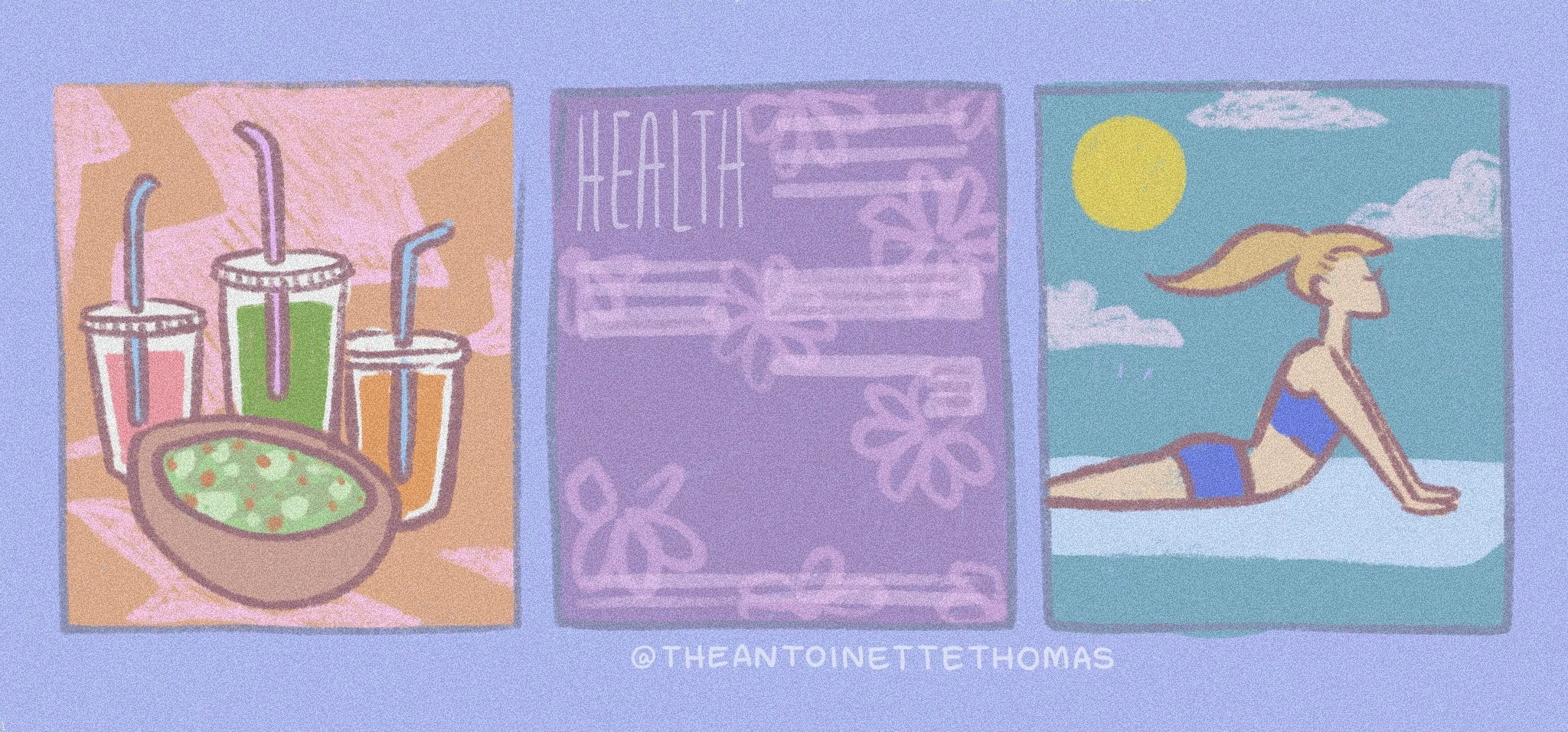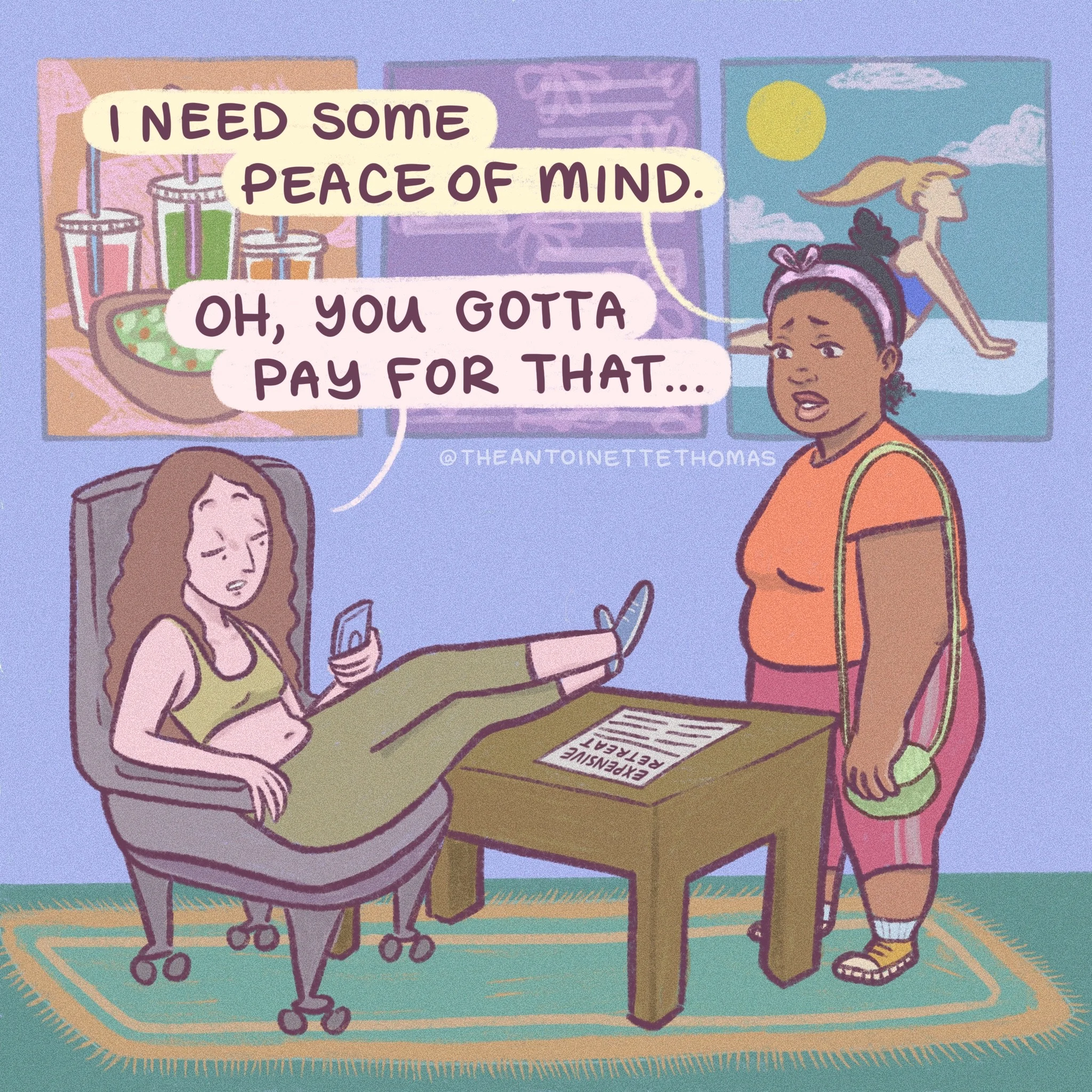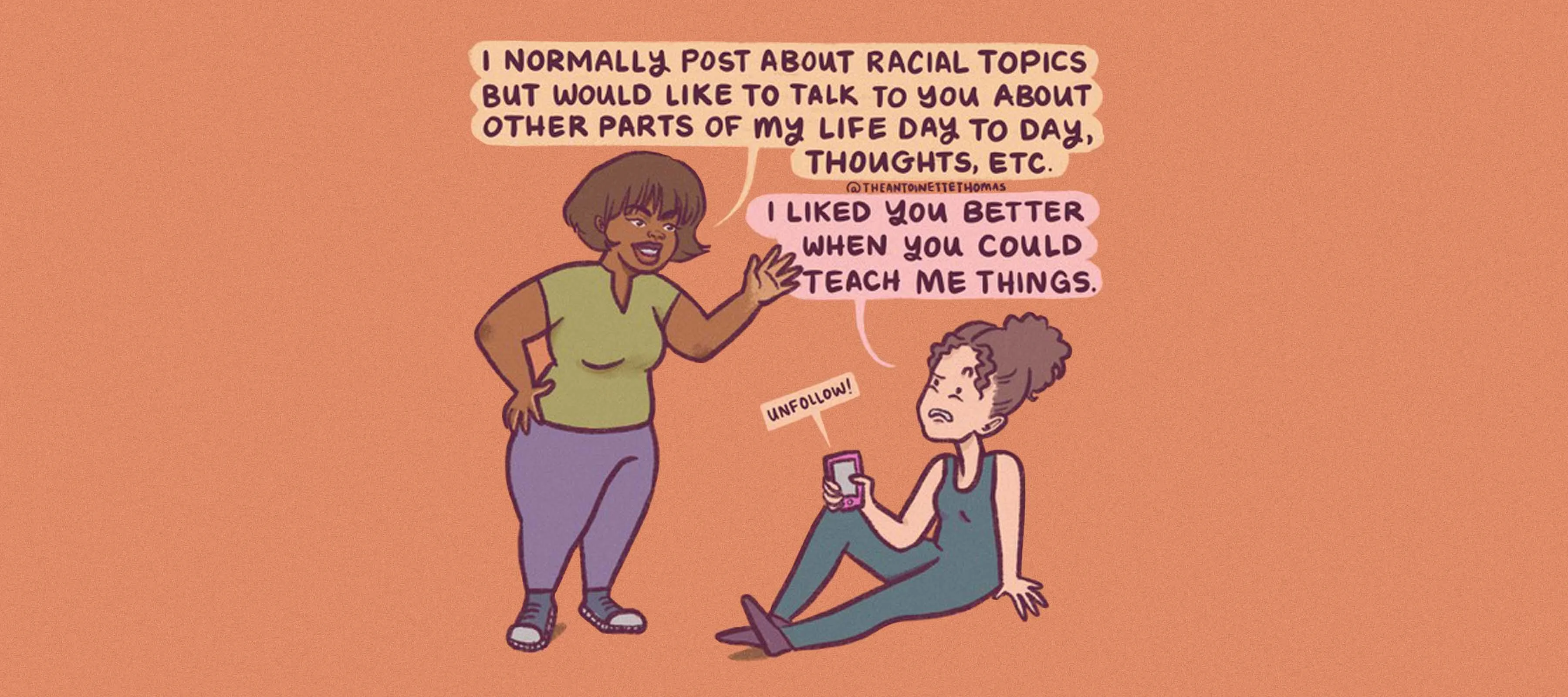Achieving Wellness in a Capitalist Society
- 29 August 2022
- ByTracy Cozette Moore
- 2 min read

Big Cartel Art Works is our initiative to provide work, opportunity, and creative freedom to artists. As the pandemic has intersected with overdue discussions on racism and inequality, we’ve been commissioning some projects that stretch beyond our normal areas of expertise. Right now, it’s time to elevate marginalized artists and learn from stories that we all need to hear.
Today, illustrator Antoinette Thomas and writer Tracy Cozette Moore share their thoughts on how capitalism and social media can stifle wellness efforts of people of color.

For quite a while now, wellness has been the name of the influencer game. Appealing to a mass desire to attend to untapped mental, emotional, and physical needs, this content has garnered creators with high visibility and wealth by repackaging the how-tos of achieving well-being. Often mimicking the holistic practices and traditions of people of color, the overwhelming representation of wellness has been white, thin, and able-bodied. Wellness content generally includes folks who consider themselves fitness trainers, food coaches, therapists, life coaches, and even spiritual practitioners.
Last month there was a hotly debated trend on TikTok started by content creator and macro coach Janelle Rohner. Her newest food hack was another “easy & delicious recipe” adding to the abundance of macro guided recipes she provides on her account. However, many viewers were confused by the arrival of this “new” snack, and it resulted in a week of extensive discussion on cultural appropriation and profit as it pertains to food. Rohner’s “Mexican Street Corn Salad” was arguably not new, just reduced. Ironically enough, the caption on the video reads “Mexican Corn Salad is BUSSIN.” Cringey application of AAVE aside, many Mexican creators responded to Janelle in their own videos urging her to just call the recipe what it is: esquites. Esquites is a popular Mexican snack that includes corn, creamy mayo, lime, fresh crumbled cotija cheese, queso blanco (white cheese), and chili powder. Zeroing in on the need to repackage esquites as a new kind of salad for the health food obsessed consumer, Latine users in the comments jokingly highlighted that Janelle’s supposed secret ingredient was probably Tajín seasoning. Many POC creators took to stitching the video to show humor and solidarity with Mexican creators, them too being fed up with the appropriation they see of their own traditional foods.
TikTok creator Soogia took to task holistic skincare creator Celeste Thomas’s “Anti-aging, antioxidant, collagen and protein promoting” tacos. An LA born and raised Korean American, Soogia concluded that the ingredients in Celeste’s video were traditional, not “unique,” and that in this regard all tacos are essentially skin-boosting. Rebranding tacos as the new skin care craze was not only a reach, but also mirrored much of what we see with consumerism. Encouraging constant and increased consumption of goods and services is part and parcel to the function of a capitalist society. In this same way, staying relevant on social media necessitates constant reinvention to drive viewership and engagement.
Mexican corn salad and skin-boosting tacos are just two examples at the forefront of a huge issue. While white content creators are remixing cultural foods into new, trendy fads to produce monetized content, this kind of appropriation is compounded by the reality that there is a 29% pay gap between white and POC creators.
You cannot discuss capitalism without addressing class and race, and this is why wellness content should be nuanced and its narration diverse. Remixing esquites or rebranding tacos and profiting from the viewership is erasure at best, and exploitation at worst. In a nation of mass deportation and intense policing of Latine vendors in inner cities like mine, it is incumbent upon white wellness creators to take a step back and unpack some of the colonialist implications of their content.
Independent and entrepreneurial creators have remodeled wellness to be something that can be bought and mass-distributed through meal plans, workout regimens, and mental and spiritual self-help. Access to wellness is exclusively granted to those privileged enough to afford it, perform it, and “manifest” it. If the bar is always being raised, if more is always being required, how are those experiencing hardships at the hands of capitalism supposed to achieve wellness? How are they to ignore the societal neglect they experience, and just receive pointers from online spaces that disqualify and exclude them? And if economic hardship lessens, how does one address the trauma that sticks around?
I grew up in the Bronx, NY, and experienced both housing and food insecurity in my youth and into adulthood. I often find myself exasperated with the fact that a huge portion of online wellness content has reduced well-being to a simple set of lifestyle choices one has the power to make to improve their quality of life. In 2010, I was diagnosed with a condition that would cause me to have several surgeries into my late 20s and ultimately change my relationship with my body. There were no lifestyle choices I could’ve made to impact or change my physical condition nor the medical neglect I experienced at the hands of the medical-industrial complex. The unsolicited advice I received from well-meaning people in social spaces has now become a bombardment of content placing the onus on me to will and work my way out of post-surgical fibromyalgia and post-traumatic stress.
Yoga Instructor and educator Nikita Desai creates content on TikTok that aims to reclaim the practice of yoga from the popular versions we see on social media and in fitness spaces. According to Desai, these versions disregard the origins and background of the practice and the people to whom the practice belongs. Desai asserts that if a space invokes the feeling that one isn’t skinny, flexible, or able enough, it is a colonized version of yoga.
While I was finishing up my undergrad at NYU, I took a yoga class to fulfill credits I was missing. During this time, I had already undergone four surgeries in response to my chronic illness. Making my instructor aware of my disability, she introduced the concept of “restorative yoga” and gave me a list of poses to do in the corner of the room while the rest of the class performed her curriculum. Over ten years later, I now understand that all yoga is inherently restorative and should call me into a deeper relationship with my present body, not the one I am told I should have. Having me off to the side while my able-bodied classmates performed her requirements othered me and demonstrated the colonization of yoga Desai urges us to reject.
I’ve personally found Desai’s content extremely helpful in regulating and attending to my fibromyalgia and post-traumatic stress. Desai urges her viewers not to get stuck on the physical benefit and instead get into the way yoga can help regulate the nervous system. There is a desperate need for exhortations like Desai’s across all facets of wellness—prioritizing diverse experiences and making space for what can be contentious relationships to wellness.
Wellness may have begun as a new way to reimagine self-determination and self-care, but it has quickly turned into an elitist and exclusionary industry. So long as wellness content creation places the onus on individual “choices” and not the injustices that impact or steal those choices, wellness will serve to act as an agent of white supremacy and discourage marginalized folks from seeking out the kind of help they need and deserve.
I believe wellness is about autonomy, access, and agency.
Autonomy: the right to self-determine what I am in need of;
Access: the ability to get that need met;
Agency: the power to direct one’s own life and control the outcome.
Existing as a Black, disabled femme means that so much of my experience is dictated by structures set up to exclude me from wellness and systems not set up for me to survive, let alone thrive. In a world that silences my needs and expects me to always be the first to prioritize everyone else’s before my own, I refuse to carry shame around what I must endure to live. That is not my responsibility.
In response to POC creators speaking about their lived experiences and rejecting how wellness masquerades as a solution, people across demographics are becoming more inclined to share their monetary resources to help folks get by. Small business owners are exchanging and utilizing their creative talents to help grow each other’s businesses. Many years ago, my best friend introduced me to the politic that we “grow across and not up.” This politic functions in and outside of my career. My resources can be shared and multiplied to bring about the survival and wellness of myself and those around me. Gatekeeping is not something we do—we open the door and put a wedge at the threshold to keep it open for the next.
It was in the Bronx that I got my first introduction to community care. Often home alone as a pre-teen, I was looked after by neighbors. In exchange, I would help with their young children. My third grade teacher was not from the Bronx and did not look like me, but often filled my refrigerator with food because she saw a little child that had a need. She went above and beyond what was asked of her as a teacher to address my living conditions and promote my wellbeing. She understood that I couldn’t learn on an empty stomach, nor could I pass a test thinking about my next meal. Through reciprocity we can reimagine wellbeing and cultivate it.
Moving away from the constant pressure of capitalism to be producing, growing, and reinventing, I have been reintroduced to the transformative power of community care. Using whatever resources, power, or privilege we have to meet the needs of those with less than us, is antagonistic to the individualistic and devastating nature of capitalism. In community care, wellness isn’t a task or a bulleted list to be checked off, it is rest for our weary minds and bodies.
29 August 2022
Words by:Tracy Cozette Moore
- Share
